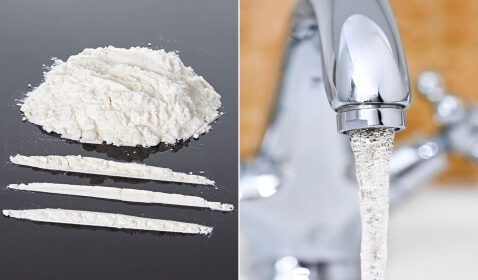The Independent reported that scientists from the Drinking Water Inspectorate had tasked themselves with finding pharmaceutical compounds in Britain’s water supply. What they discovered were traces of cocaine in the water, even after it had been treated and purified.
According to the Huffington Post, researchers found that benzoylecgonine, the metabolized form of cocaine, was common in samples of drinking water that they tested. That compound is the same that is used to flag cocaine use in drug tests. Caffeine, the over-the-counter pain killer ibuprofen, and a drug used to treat epilepsy were other compounds were also found in the water. According to the Independent, Nearly 700,000 people aged 16 to 59 are estimated to take cocaine every year in Britain.
Scientists have reported that although the compound was widespread, that it isn’t present at levels that would be harmful to humans. The report said that, “Estimated exposures for most of the detected compounds are at least thousands of times below doses seen to produce adverse effects in animals and hundreds of thousands below human therapeutic doses.”
Cocaine is a stimulant, an appetite suppressant, and a nonspecific voltage gated sodium blocker, which in turn causes it to produce anesthesia at low doses. Cocaine is addictive and in high doses can cause sudden cardiac death.
Steve Rolles, senior policy analyst at Transform Drug Policy Foundation, told The Sunday Times that,“[Britain has] the near highest level of cocaine use in Western Europe.” Steve Rolles said that according to the Huffington Post that,“It has also been getting cheaper and cheaper at the same time as its use has been going up.”
According to USA Today, a 2008 survey of more than 27 metropolitan areas found traces of pharmaceuticals in at least 17 different water supplies in the United States. The Huffington Post reported that, there was no cocaine found in the U.S. drinking water when surveyed in 2008.
Image credit: www.nypost.com













































